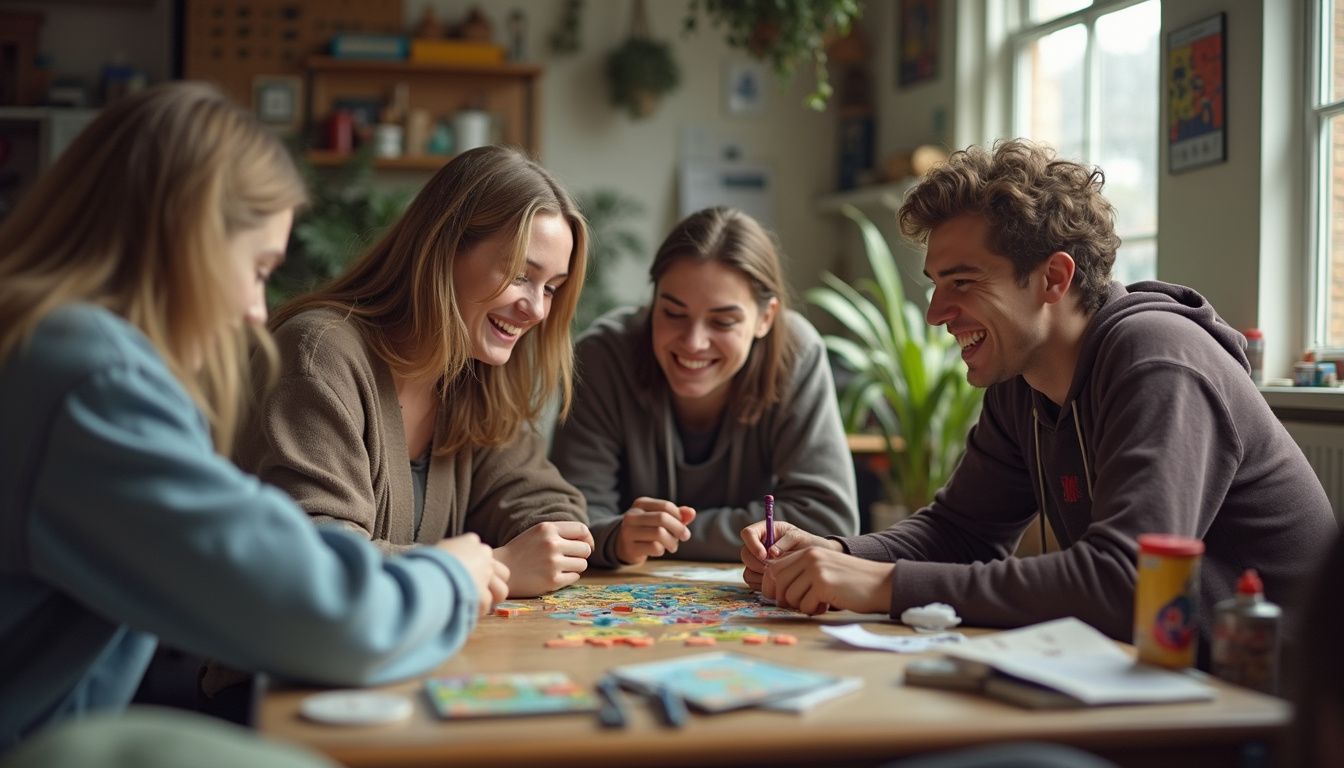Ever find yourself at a party feeling like you’re trying to solve a puzzle with the wrong pieces? If you’ve ever frozen up during small talk because of social anxiety, you’re definitely not running solo.
In fact, recent data shows that social anxiety disorder affects about 7.1% of American adults in any given year, which is around 15 million people. It’s one of the most common mental health conditions out there.
I get it. For a long time, navigating social stuff felt like trying to debug code written in a language I didn’t know.
But what if I told you that you could approach social skills like leveling up in a game? This guide on how to become a social nerd will walk you through the simple steps, tools, and daily quests to help you build confidence and feel more at ease in any group. I’ll show you the exact tips that have worked for geeks like us.
Key Takeaways
Around 7.1% of U.S. adults experience social anxiety, making it a common challenge that can be improved with simple, daily actions.
Small steps like making eye contact, giving specific compliments, and joining hobby groups can build social experience and confidence over time.
Apps designed to help with social skills, such as Proloquo2Go for communication or Habitica for gamifying progress, provide structured ways to practice and grow.
Tracking your progress with a notebook for “social quests” or using a habit tracker helps you reflect on what works and what feels awkward, leading to steady improvement.
Putting your phone away in public and joining structured groups like local board game nights or a Toastmasters club creates safe, low-pressure environments to practice your skills.
Table of Contents
What does being a social nerd really mean?

First off, let’s get a clearer picture of what makes a social nerd tick. Nerdiness often takes root in childhood or adolescence, with many of us spending hours buried in intellectual hobbies as a way to cope with feeling avoidant or just a bit out of sync with the usual social circles.
Some geeks may be on the autism spectrum (what was once commonly called Asperger’s Disorder) or have a diagnosis like Schizotypal Personality Disorder. Both of these can influence social behavior and sometimes create a sense of indifference during casual chats. One classic sign is focusing on deep logic over small talk, you might find yourself thinking about the physics of a warp drive while everyone else is discussing sports.
Social nerds don’t usually run from silence; sometimes we prefer it to a conversation that feels forced. This trait is common in tech offices, which can limit dating opportunities but leads to some amazing hackathons and epic Dungeons & Dragons campaigns.
Our intellectual passions become powerful coping tools for dealing with past rejection or paranoia. The flip side is that this can lead to loneliness if we’re missing that deeper emotional intimacy. Clinical psychology suggests that nerdiness isn’t just one thing; it’s a mix of factors, including personality disorders and things like a pervasive developmental disorder.
You start to realize that even the most awkward encounters have the potential to grow into real friendships, sometimes faster than you can debug a tricky piece of code. For example, I’ve met a surprising number of close friends on Zimpler Casino.
Leveling up your social skills

Social confidence isn’t something you’re born with, it’s a skill you build. Every chat, handshake, and shared laugh is like gaining experience points. Even tiny steps, like making real eye contact or saying hi at the comic shop, can completely change the game.
How can I start with simple daily interactions?
Small talk can feel like a boss battle, but you can level up by making tiny moves every single day. Think of these as your daily quests.
- Practice eye contact in the mirror. Seriously, just hold your own gaze for a few seconds each morning. It makes it less weird when you do it with other people.
- Greet the barista. A simple “Good morning” before you order your coffee is an easy win.
- Say hi to a coworker. Even if it’s just a quick hello to someone you normally pass in silence, it counts.
- Ask a stranger for the time. Your phone already knows, but asking a real person builds courage fast.
- Compliment a nerdy t-shirt. See someone with a cool Star Wars shirt? A quick “Awesome shirt!” can open a door.
- Hold a door open. Do it without hiding behind your phone screen while you wait.
Every little attempt is a victory, whether you have autism, Asperger’s disorder, are developmentally delayed, or just feel nerdy. Keep a log of what felt weird and what worked. Many psychotherapists suggest this for tracking mental health progress because it turns vague feelings into actionable data.
What is active listening and how do I practice it?
Active listening just means you’re fully focused on the person talking, not just waiting for your turn to speak. It sounds simple, but according to communication expert Julian Treasure, we retain only about 25% of what we hear.
To get better, I try to use a framework I learned from Treasure called RASA. It stands for:
- Receive: Pay attention and face the person. Don’t plan your reply, just absorb what they’re saying.
- Appreciate: Make small noises like “hmm,” “oh,” or “right” to show you’re engaged.
- Summarize: Briefly repeat back what you heard. Using the word “So…” is a great way to start, like, “So, you’re saying the new update broke the build?”
- Ask: Ask questions afterward to clarify and show you care.
Practicing mindfulness meditation for just five minutes in the morning can also make a huge difference. Apps like Headspace or Calm have guided sessions that train your brain to stay present during conversations. It helps people with Asperger’s disorder and general anxiety feel more relaxed and avoid awkward moments.
“Most people do not listen with the intent to understand; they listen with the intent to reply.” – Stephen R. Covey
How do I ask thoughtful questions in conversation?
A great way to start is with a compliment. Something like, “Cool boots! Are they new?” makes people relax. Then, follow up with an open-ended question about their interests. Instead of asking a “yes” or “no” question, try something like, “What got you into coding?” People genuinely like talking about their passions.
The key is to ask open questions that invite stories, not just one-word answers. A closed question like, “Did you have fun?” often stops a conversation in its tracks.
I once boosted my own social XP by giving a compliment and then asking about favorite video games. It quickly moved beyond small talk into a fun debate about a shared interest. If you feel anxiety creeping in, focus on asking just one genuine question. Even something simple like, “What’s your favorite console and why?” can get most geeks talking.
Mastering social confidence

Everyone feels weird sometimes. The trick is learning to stay cool, use easy body language, and share real praise. These skills can turn a geek into the most interesting person in the room. If you’re ready to level up your confidence, let’s keep going.
How can I embrace and learn from awkward moments?
I used to overthink every joke that didn’t land. Now, I just treat those moments like earning a few XP in my social skill tree. The truth is, everyone has awkward stories, especially at conventions or tabletop game nights.
When an interaction feels weird, I try to analyze it later. Did I misread the room? Did my joke about binary code not land with a table of artists? This kind of reflection turns a cringey moment into a data point for future success.
I’ve found that sharing these fumbles with other introverts on Discord or Reddit actually builds stronger friendships. Most people can relate to feeling out of place, and owning the awkwardness makes you more human and approachable.
What open and relaxed body language should I use?
Your body language often says more than your words. Standing with your feet shoulder-width apart can project confidence. Keep your back straight and let your arms hang loosely at your sides, avoiding crossed arms or clenched fists, which can signal that you’re closed off.
Try to take up a comfortable amount of space. You don’t need to posture like a superhero, just avoid slouching or making yourself small. In her popular TED Talk, social psychologist Amy Cuddy explained how “power posing” for just a couple of minutes can change your body chemistry to make you feel more confident.
Make eye contact for a few seconds at a time. You don’t need to stare, just connect. And a genuine smile is like a universal social algorithm that works every time.
Actions speak louder than words, especially when those actions smile back.
Keep your gestures open and relaxed to make others feel welcome. Respect personal space to avoid any bugs in the social code, and make sure your movements match what you’re saying. No one trusts dialogue that doesn’t sync with the avatar’s animation.
How do I develop a habit of giving genuine compliments?
Start small and be specific. Instead of a vague “good job,” try something detailed. “Cool boots!” or “That’s an awesome dog!” works well on just about anyone. Aim to give two or three of these compliments during your daily social interactions, whether you’re at the coffee shop or walking across campus.
Make eye contact when you say it, then just move on. This keeps the moment low-pressure and relaxed. The goal is to make someone’s day a little brighter without asking for anything in return.
You can even turn it into a game. Apps like Habitica or Habitify can help you build the routine by letting you track your progress. Sincere words boost confidence for both you and the person you’re complimenting, so keep your tone natural and have fun with it.
Building a social life game

Think of improving your social life just like you’re leveling up a character in your favorite RPG. By setting daily goals and creating a reward system, every interaction can feel like a quest with a clear objective and a fun prize at the end.
How do I set personal challenges to improve social engagement?
Building social confidence feels a lot less intimidating when you treat it like a game. Setting your own quests makes the process fun and manageable.
- Define your main quest: Know what you want to achieve, like making a new friend or joining a club.
- Start with Level 1 tasks: Say “hello” to one new person each day. This is great for mental prep and gradual progress.
- Use your strengths: If you’re a trivia whiz, start conversations around pop culture or science facts.
- Try Level 2 challenges: Give three genuine compliments in a week. This is a low-risk way to practice positive interactions.
- Engage in Level 3 activities: Ask follow-up questions during conversations to keep them flowing and go deeper.
- Join structured activities: A board game group or a Toastmasters club lets you practice skills with people who geek out over the same things you do.
- Create a points system: Earn “XP” for each completed challenge and treat yourself when you hit a milestone.
- Keep a quest log: Jot down notes in Google Keep or a notebook to figure out what worked and level up faster.
You can track your progress with an app like Habitica, which turns your real-life goals into a role-playing game. It’s a fun way to stay motivated.
How can I reward myself for social progress?
Gamify your social skills by giving yourself XP for every chat or group event you participate in. When you hit a milestone, like talking to three new people at work, reward yourself with something you actually want, like a pizza night or that new skin in a game you’ve been eyeing.
I keep an old spiral notebook where I log every “social quest” I complete. Seeing the checkmarks next to things like “gave a genuine compliment” feels surprisingly rewarding. It also helps to share your wins with someone who supports you.
Sometimes just telling a friend about a small victory is a reward in itself. Remember to give yourself credit for the little things, like choosing not to wear headphones on the bus and starting a conversation instead.
Progress is progress no matter how small.
Tools and strategies for success
Give things like improv clubs and hobby meetups a real shot. You can also use role-playing chatbots like Replika or social skills apps to get some practice reps in before talking with new people. These tools can really boost your confidence.
What structured social activities should I join?
Board games are a fantastic way to bring nerds together. Look for a Settlers of Catan night at a local shop or start a Dungeons & Dragons campaign with friends. Team sports can also be great, even if you’re not super athletic. The shared goal builds teamwork and connection.
Here are some other great options to explore:
| Activity | Typical Cost | Why It Works |
|---|---|---|
| Meetup Group | Often Free | Find groups for anything from coding to sci-fi, ensuring you meet people with shared interests. |
| Board Game Cafe | $5-$10 cover | A low-pressure environment with a built-in activity to focus on. |
| Toastmasters Club | ~$15/month | A structured, supportive place to practice public speaking and gain confidence. |
Signing up for a class in something you’re curious about, like art, music, or tech skills, is another great strategy. Recurring activities make social practice a natural part of your schedule.
How can limiting phone and headphone use improve social interactions?
Your phone can feel like a shield in public, but it often builds a wall between you and the people around you. It’s an easy way to dodge anxiety, but it also robs you of opportunities for real conversations. Studies consistently show that excessive phone use can lead to weaker social skills, especially in younger people.
Putting your phone away forces you to be present and make eye contact. It signals that you’re open to interaction. Wearing headphones has a similar effect, acting like a “Do Not Disturb” sign. Taking them off makes it much easier for someone to approach you with a simple “Hey.”
What apps or tools help practice social scenarios?
While limiting screen time in public is helpful, your phone can still be a powerful training tool. For those on the autism spectrum or anyone wanting to practice, specialized apps can make a huge difference.
Here are a few that therapists often recommend:
- Proloquo2Go: This is a powerful communication app that helps individuals with limited verbal abilities express themselves using symbols and text-to-speech.
- Autismate: This app focuses on life skills and routine management, using visual schedules and social stories to help users navigate daily activities with more confidence.
- Tiimo: A visual daily planner that helps reduce stress around time management by using icons and color-coding to make schedules easier to follow.
For more general skill-building, Toastmasters International provides excellent public speaking guides and real-world feedback. I joined a local club a few years ago and learned more about connecting with an audience in a few months than I had from any book.
Maintaining and growing your social skills
The key to long-term growth is to keep practicing with people who share your passions, whether that’s at a coding club or a tabletop game night. Using tools like a journal or mood tracker can also help you see how far your social confidence has come.
How do I network with like-minded people?
Find your tribe by going where they hang out. Attend local coder meetups, science fairs, or writer’s groups to connect with people who get excited about the same things you do.
Don’t just stick to in-person events. Use social media for more than just scrolling. Join Discord servers or subreddits built around your hobbies. This is where you can move from shared interests to authentic friendships. A Reddit thread on r/socialskills recommended this exact approach, noting that you should “apply your nerd powers to social skills.”
Once you connect with someone online, don’t be afraid to suggest a low-key meetup, like grabbing coffee or checking out a new comic shop. Reward yourself for each new connection you make to keep the motivation high.
What are effective methods for regular self-reflection?
Keep a log of your social interactions in a small notebook or a digital journal app like Day One. After a key moment, jot down your thoughts, feelings, and what you think went well or felt awkward. At the end of the week, read over your notes to spot patterns.
You can also use AI chatbots like Replika to talk through your interactions. It sounds a bit odd, but it can be a useful, judgment-free space to practice conversation and reflect on your progress.
Turning your missteps into funny stories can also be a powerful tool. It reframes them as data points for learning rather than failures. This whole process boosts your self-awareness and helps you fine-tune your strategies for the next social quest.
How will being a social nerd evolve in 2025?
The world is definitely shifting, and it’s becoming a better place for social nerds. Online platforms, forums, and social media groups are continuing to become more welcoming spaces for geeks and introverts. It’s easier than ever to find people who prefer thoughtful conversations over generic small talk.
The stigma that used to be attached to being a nerd is fading. Companies are recognizing the value of having diverse personalities on their teams, including the techie who loves comic books or the coder who excels in weekend-long hackathons.
Building social skills is now seen as a gradual process with clear, manageable steps. You can start with friends or family as your Level 1 practice partners before moving on to strangers. Structured activities like tabletop gaming clubs and coding bootcamps are leading the way in reducing the anxiety around group events.
Apps like Meetup are connecting people with shared interests faster than ever, so no one has to feel left out. As long as you stay patient and make time for self-reflection, your confidence will continue to level up. Dr. Jesse Hanson’s latest review on September 15, 2025, highlights this, emphasizing that the future is bright for a more inclusive and understanding world.
People Also Ask
What does it mean to be a social nerd, and how do the 8 levels help?
A social nerd treats social skills like a video game, using logic and curiosity to level up. Think of the 8 levels as a skill tree, guiding you from simple “hello” quests to mastering group conversations.
Can anyone improve their social confidence using these steps?
Absolutely, you build social confidence one small skill at a time, just like any other ability.
How do I handle nerves when talking in groups as I move through the levels?
Nerves are totally normal; when you feel them, try a simple grounding technique like box breathing, which is even used by Navy SEALs. Focusing on your breath for a moment can calm your mind so you can listen to the conversation instead of your anxiety.
Are there shortcuts for shy people who want faster results?
The fastest way to improve is by practicing in low-pressure settings that you actually enjoy. Join a Discord server for your favorite game or find a local board game meetup to talk about things you’re passionate about.
References
https://medium.com/about-me-stories/become-a-social-nerd-heres-why-614ec78d7197
https://www.doctornerdlove.com/5-ways-to-improve-your-social-skills/
https://www.lemon8-app.com/@andrea.as.an.author/7446477743296102955?region=us
https://pmc.ncbi.nlm.nih.gov/articles/PMC11120223/
https://www.nerdfitness.com/blog/how-to-be-awesome-at-approaching-people/ (2015-10-16)
https://www.doctornerdlove.com/basics-body-language/ (2011-07-22)
https://www.facebook.com/groups/1725972127657416/posts/3690600931194516/
https://www.conquerandwin.com/anxious-nerd-to-social-beast/
https://www.psychologytoday.com/us/articles/200307/build-your-confidence
https://childrensinnovationcenter.org/the-effect-phones-have-on-adolescents-social-skills/ (2019-11-18)
https://gabb.com/blog/do-smartphones-stunt-social-skills/ (2024-12-18)
https://learncues.com/blog/best-apps-improve-social-skills (2025-06-12)
https://www.lemon8-app.com/@_shayp/7351645165448430086?region=us
https://theartofcharm.com/art-of-personal-development/better-networking-through-social-practice/
https://www.betterup.com/blog/how-to-improve-social-skills (2025-01-22)
